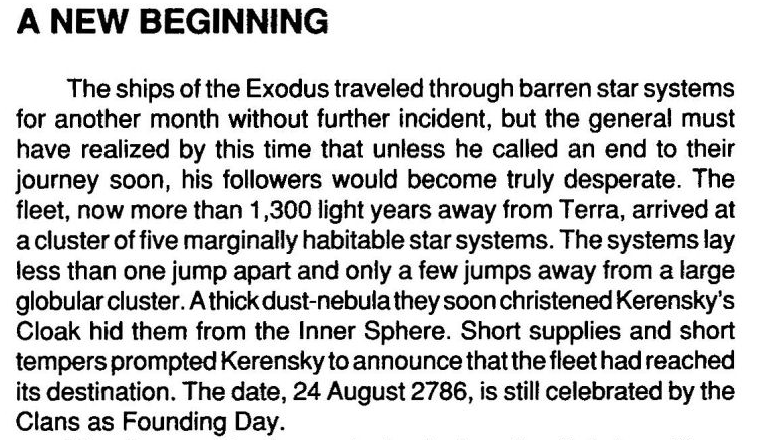 Nakuru, on 23 October 2012 - 06:18 PM, said:
Nakuru, on 23 October 2012 - 06:18 PM, said:
Raw numerical advantage: To use that as an argument in Battletech/Mechwarrior is to forget how easily any of the Houses hold onto the worlds they conquer from their enemies under any circumstances and ignore the fact that Battletech itself ignores this statistic. Total population tends to not matter within the confines of Battletech, so using it in this argument is pointless. And if you're going to use this for the IS vs Clan argument, you also need to consider it for the conflicts between the Successor States as well. It gets tricky and messy, and some of the difficulties spread from your final point.
Inner Sphere tactics/Total Warfare: There are many ways of fighting wars without striking at supply lines and roadside bombs as well. A skilled Clan tactician can take into account Inner Sphere tactics and minimize losses to this, and using this as an argument assumes that this tactic is all it takes to win a war. Plus, if the Inner Sphere attacks supply lines, then wouldn't it be an ***** commander to not adapt by sending defenders to escort their shipments if this tactic is being used?
Information Warfare: You forget that the Clans use more than one method of deploying forces. The Clans can choose to bid their forces, where they openly announce what they are using. Or they can invoke/request safcon, in which no one is required to declare the forces that either side is using. This means that each side can be just as blind as the other as to what forces are fielded. Furthermore, the Clans aren't completely opposed to using underhanded tactics as long as they keep it within their warrior code and will fight as warriors on equal ground, and even then, there are some who have no limits to how far they will go. (Example: Clan Wolf's "defeat" by the Jade Falcons during the Great Refusal) Besides, that's also assuming that the Clans have no intelligence networks. They, in fact, do.
Problems of Unity: The main argument of this thread is whether the Clans could hold the IS. If one of the Clans were to become declared IlClan, ideally, the rest of the Clans would fall in line and declare loyalty. Realistically, this would actually be more complex than that, but because of the fragmented nature of the Inner Sphere already, it's more of a matter of keeping the Sphere unified than it is the Clans holding onto it.
Bidding: A smart Clan commander wouldn't trust the IS commanders very much, would he/she? A smart one would remember what happened to the Smoke Jaguars at Luthien and keep that in mind when bidding, if they were to use it. As I said before, though, the Clans can also request/invoke safcon, which somewhat removes the advantage the IS has through the use of deceit. In this case, neither Clan nor IS is expected to declare their forces, which leaves each side just as blind as the other. The Clans don't see bidding as necessary, just preferred, and they are willing to use safcon.
Zellbrigen: The Clans started to rethink their use of Zellbrigen after their defeat at Tukayyid, and some never completely adhered to its rules strictly. Furthermore, if an enemy warrior openly and completely breaks the rules of Zellbrigen, the commander of the Clan forces in the conflict can declare the rules of engagement broken and discard it completely for the remainder of the battle. Not to mention this one particular rule of Zellbrigen:
A warrior has right to refuse challenges from Inner Sphere units, especially if underhanded ploys are suspected.
Which means that a Clan unit can actually openly defy Zellbrigen when engaging the Inner Sphere. Most Clan warriors choose to still follow it even when fighting the IS, but they are allowed, without penalty, to break it willingly.
Population Control: The Clans actually frequently practiced simply conquering the planets military and ignoring the civilians to move on to the next. Garrison units were sent instead to defend the conquered world, and some of the citizens may be taken as isorla, but much of the populations were ignored upon conquest. Besides, using this argument, you also need to consider the same thing with the Successor States conquering one another's worlds, at which point you can see that Battletech actually frequently ignores the complexities of population control unless they need it to advance a specific plot point, and...well, play MechWarrior 2: Mercenaries, and you'll get the idea. It basically feels like most of the populations are willing to live under anyone at anytime unless someone is actively shooting them, and once the gun is put down, they're willing to serve under them again.
You provide a point-by-point analysis of how my points _can_ be flawed, but fail to provide a scenario where it works. I await your scenario.




























